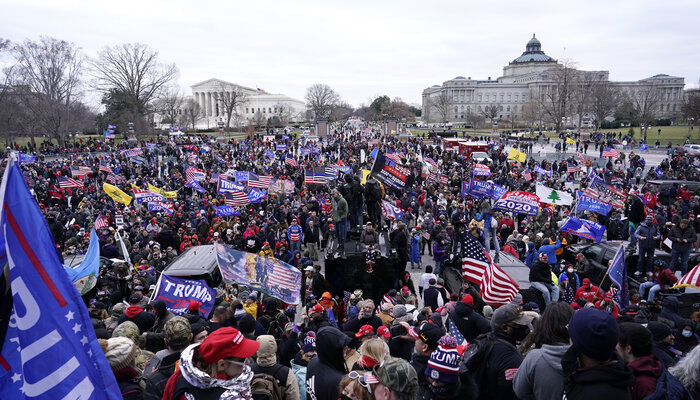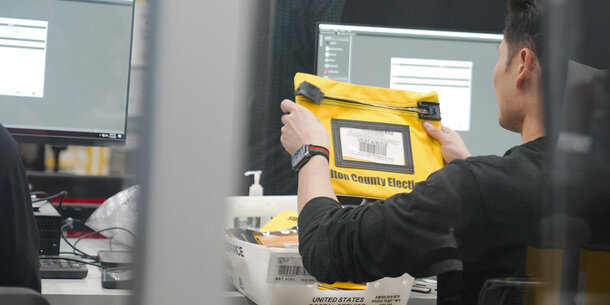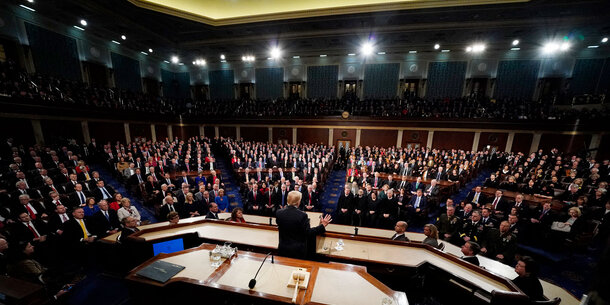In a famous dissent written 102 years ago, Supreme Court Justice Oliver Wendell Holmes issued his clarion call for a vigorous First Amendment based on the free marketplace of ideas. But his epic “fighting faiths” passage ended with this caveat: “I think that we should be eternally vigilant against attempts to check the expression of opinions that we loathe and believe to be fraught with death, unless they so imminently threaten immediate interference with the lawful and pressing purposes of the law that an immediate check is required to save the country.”
An imminent threat of immediate interference with the law — that’s a good description of the Trump-infused insurrection at the Capitol in January. We all have a First Amendment right to speak and to assemble and to protest for the causes that animate us. We all have a right to take to the streets to express ourselves so long as we are peaceful and follow the law. The government cannot prosecute or otherwise punish us for these actions. Everyone from Black Lives Matter protesters to white supremacists has this right. Police officers do, too.
But none of the individual freedoms enshrined in the Bill of Rights come to us without limitations. We cannot use our words to defraud our neighbors or extort our rivals. We cannot use our words to plot a murder or conspire to rob a bank or to incite violence.
And in the case of police officers and the First Amendment, the limitations go even further when it comes to whether they can both express certain views and be cops. The Supreme Court has long held that public employees (like police officers) have narrower free speech rights than the rest of us in certain circumstances. In other words, as Holmes wrote in 1892 when he was on the Massachusetts Supreme Court, a cop has a constitutional right to talk politics but no constitutional right to be a cop.
Off-duty officers had the right to go to Washington to take part in the Trump rally on January 6 designed to stoke insurrection and pressure lawmakers to overturn the results of the free and fair presidential election. But the rest of us have the right, indeed the obligation, to evaluate what the exercise of that right by those cops says about their professional judgment, their temperament to be peace officers, and their commitment to upholding the law in the future based on the objective realities of the world. Some of these cops will lose their jobs because they took part in a Trump rally qua riot fueled by worthless “evidence” of election fraud and big lies.
We don’t yet know how many police officers attended the Trump rally that turned into a deadly riot. The Washington Post two weeks ago reported the count was “at least 13,” but the number is surely much higher. We know that line officers went to the Capitol to, at a minimum, protest the results of the election and we know that sheriffs did, too. We know that some already have been suspended or charged. And we know that their first line of defense after being caught has been to wrap themselves in the First Amendment and say they were merely exercising their rights as private citizens.
It’s also possible that some of the police officers who participated in the Trump rally-turned-riot are fired for their roles in the insurrection (whether they are prosecuted or not). Some already have been. And it’s possible that some will then turn around and sue their departments for retaliation by arguing that they were unconstitutionally dismissed for exercising free speech rights. Those lawsuits will likely turn on how judges apply a legal balancing test that weighs the officer’s right to speak versus their employer’s right to have a police department that doesn’t include in its ranks conspiracy theorists who embrace baseless allegations that are used to foment insurrection.
That narrative has spread across the nation, even as we learn more about the extent to which cops were involved on January 6. “We are making clear that they have First Amendment rights like all Americans,” Houston Police Chief Art Acevedo said last week when he accepted the resignation of an 18-year veteran of the department who was involved in the Capitol riot. “However, engaging in activity that crosses the line into criminal conduct will not be tolerated.” The problem is that Acevedo’s first sentence is simply not true. Even when they are off-duty, case law tells us that police officers don’t have the same First Amendment rights as civilians.
The original rule (sometimes called the “Pickering/Connick test” to identify the cases which spawned it) comes from two Supreme Court rulings issued nearly a generation apart, in 1968 and 1983, that define First Amendment protections for public employees — i.e., those working for the government. Judges must balance the interests that police officers have in expressing themselves on political issues against the interests that police departments (and frankly the rest of us) have in being confident that cops can do their jobs effectively and fairly.
In a 2006 case, the Supreme Court explained some of its rationale for limiting a public employee’s free speech protections. In that case, about a prosecutor in Los Angeles who blew the whistle on poor police work and was fired for it, Justice Anthony Kennedy wrote, “Without a significant degree of control over its employees’ words and actions, a government employer would have little chance to provide public services efficiently. Thus, a government entity has broader discretion to restrict speech when it acts in its employer role, but the restrictions it imposes must be directed at speech that has some potential to affect its operations.” (citations omitted)
“The courts have long recognized that public employees have a First Amendment right to participate in public debates on important matters. However, government employers may punish employees whose speech, even outside of work, compromises their ability to do their job,” Ben Wizner, director of the ACLU’s Speech, Privacy, and Technology Project, told me via email. “Although each case has to be decided on its own facts, courts have upheld discipline or termination of police officers, who are armed agents of the state, for making statements in their personal capacity that undermine their ability to maintain the trust of the community they serve.”
Let me offer a hypothetical that I think fairly illustrates the issue in the context of the Capitol riot. Pretend for a moment that you are a police chief. A body is found in your town. An investigation ensues. Half the town believes the death is a natural one. Half the town thinks it’s murder. The evidence is collected. It becomes clear beyond all reasonable doubt that the death was a natural one. Scores of judges, of all ideological stripes, say so. So do the witnesses with direct knowledge of what happened to the victim. With no axe to grind, with no agenda other than to tell the truth, one by one they testify that there was no murder.
In spite of all of this, a local cop refuses to believe the evidence before him. Refuses to respect the rulings of all those judges or the testimony of all those witnesses. So skeptical of objective truths, so unwilling to appreciate the evidence he can see with his own eyes, he’s remarkably not skeptical of the conspiracy theories that tell him the victim was murdered. The judges are in on the scam, this cop believes, and so are the witnesses. The murder was part of a crime so elaborate it involves countless co-conspirators and a level of coordination that beggars belief. No matter, the cop says, he knows what he knows. It was murder.
The cop doesn’t just indulge in this fantasy in his own mind or in his private life. He doesn’t just spread his views at his local bar or a neighbor’s barbeque. He actively participates in the fantasy, he broadens and strengthens it, by joining with countless other like-minded conspiracy theorists who travel to Washington to take part in a rally centered around the idea that the victim was murdered. And not just a demonstration in support of that lie but also the dangerous proposition that the people who are saying otherwise — that is, the people whose view of the world is rooted in objective evidence — should be torn from office or killed.
The cop returns home and finds himself criticized for taking part in the event. So he says he was merely participating in protected speech as a private citizen. He says he had no idea a political rally would turn violent. What is his boss supposed to do about that? Here’s a cop who has shown a propensity for ignoring evidence, who has disrespected judicial rulings, and embraced conspiracy theories with alarming gullibility. Here’s a cop who makes common cause with an angry mob. What do these things say about his ability to separate fact from fiction on his job? What do they say about his ability to synthesize facts and evidence in a routine criminal investigation? Should a jury trust this cop’s credibility on the witness stand?
These are precisely the sorts of considerations the Supreme Court says judges must weigh in evaluating the First Amendment claims of police officers who are fired for off-duty behavior. Assuming the police officers who attended the rally were engaging in lawful speech and not illegal conduct, does that political speech affect public perceptions of the law enforcement agency? Does it undermine the relationship between the speaker and his fellow officers? Does it impede the ability of the department to recruit officers, or generate hostile media coverage? The cops who traveled to Washington to support baseless election fraud claims won’t be able to avoid these questions if they want to prevail with their lawsuits.
For me, the answers to these questions are self-evident. There should be a presumption of disqualification for any law enforcement officer who went to the Trump rally, whether they participated in the subsequent storming of the Capitol or not. A cop who believed two months after the election that it had been stolen by Joe Biden should be required to explain under oath why he or she deserves to continue to be a peace officer. A cop who believed that countless state elections officials, and federal and state judges, were part of a vast conspiracy to defeat Trump must explain why he ever should be able to investigate a crime or testify under oath as a credible witness for the state.
These journeys to Washington for Trump’s rally were not spur-of-the-moment decisions. They were planned. At every step along the way the participants could have opted out, could have said to themselves that as peace officers they would not march for a cause based so obviously on a series of partisan lies. You can bet that federal prosecutors will be making a form of this argument if and when the criminal trials against the alleged Capitol rioters proceed. You can also bet that attorneys representing police departments will be making the argument too to defend against retaliation lawsuits by fired cops.
These employment retaliation cases are so fact-specific it’s hard to discern patterns. But there is lower court precedent, too. The U.S. Court of Appeals for the Fifth Circuit in 2015 ruled in favor of city officials who fired a police officer for posting comments on Facebook that were critical of her bosses. Susan Graziosi was speaking as a public employee, the judges concluded, but was not speaking on a matter of public concern because her complaints focused on internal police matters. But the court then concluded that even if Grazioisi were speaking out on a public matter (as our seditionist cops surely were) she still would have lost her employment lawsuit because police officials have a strong interest in preventing insubordination.
And it’s unclear how the current Supreme Court will look at these issues. It is much more conservative than it was in 2006 when Justice Kennedy helped narrow the free speech rights of public employees. And it is certainly more conservative than it was in 1968 when the it first articulated the legal test that lower court judges must apply in these cases. It’s also unclear, at least now, how hard police union officials will fight for the rights of these cops who are charged with federal crimes for their roles in an event that led to the death of one Capitol Police officer and injuries to scores more.
David Hudson, an expert on free speech at the First Amendment Center, disagrees with me. He told me, echoing Wizner, that punishing officers for merely attending the Trump rally, regardless of the conspiratorial theories that led them there, would be an impermissible infringement on those officers’ constitutional rights. “Police officers should not be dismissed generally because of their political beliefs or association with particular viewpoints or such,” Hudson told me. “That said, any police officers who engage in unlawful conduct or rioting should be subject to discipline. Police officers are held to a higher standard and must be positive examples. They are there to protect and service, not disrupt and riot.”
But the cases involving insurrectionist cops who participated in the Capitol riot will be easy to resolve. Cops who broke the law should and will be fired and they will lose their retaliation claims if they bring them. The closer question is the one I am posing: where the officer merely attended the January 6 rally to promote unfounded election fraud theories in the hope of overturning the election. When police officers exercise their First Amendment rights by revealing themselves to be persistently hostile to verifiable facts, they are telling the rest of us a great deal about the judgment they bring to their work. They are saying they no longer deserve to be taken seriously as credible officers of the court.
Hudson, the free speech advocate, says that the law does and should allow a cop to believe in — and act on — conspiracy theories and still carry a badge so long as his conduct is lawful and appropriate. That the law recognizes that the same mind could sustain the fantasy that Donald Trump won the 2020 presidential election and also maintain the capacity for the reasoned judgment necessary to carry out the duties of a law enforcement official — and that the former doesn’t infect the latter. Tell that to the victim who wants her crime solved quickly and correctly or to the defendant in the dock waiting for that conspiratorialist, insurrectionist cop to testify against him.
The views expressed are the author’s own and not necessarily those of the Brennan Center.


